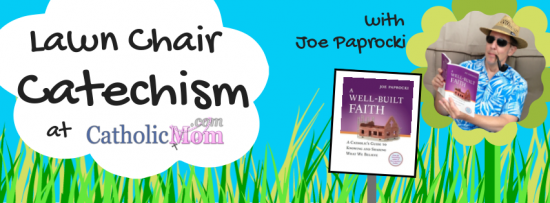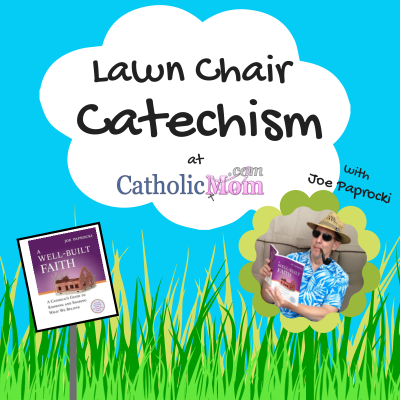Welcome to this summer’s Lawn Chair Catechism! We're reading Joe Paprocki’s best-selling book, A Well-Built Faith: A Catholic’s Guide to Knowing and Sharing What We Believe. We’re taking it one chapter at a time all summer long.

When we seek guidance from God’s Word, we can turn to Sacred Scripture and Church Tradition.
If someone claims to have authority to perform a very important task, we want to know that we can trust that individual. If someone pounds on your door and says, “Open up! Police!” you certainly want to verify that they have a badge before you let them in. Authority and trust go hand in hand.
We place our trust in God because God has full authority—God is, after all, the author of life! God, in turn, has given full authority to his Son, Jesus Christ. Jesus himself said, “All authority in heaven and on earth has been given to me.” (Matthew 28:18, RSV).
Jesus, in turn, gave full authority to Peter and the Apostles when he told Peter that he would build his church upon him and gave him the keys to the king- dom. (Matthew 16:18–19). This means that we are called to place our trust in Church leadership, which speaks and acts with the authority that comes from God through Jesus Christ and the Apostles.
We face many challenges today that the Bible did not explicitly speak to. For example, if we are looking for guidance in the area of medical ethics and genetic engineering, we are exploring a challenge that did not exist in biblical times. To rely on Scripture alone to guide us in such an area severely limits us. The Magisterium, which is part of the Church’s Tradition, can provide us with the guidance we need to make informed decisions that are grounded in God’s revealed Word.
Questions for Reflection and Discussion:
- What is your understanding of Church Tradition, as opposed to Church traditions?
- What advantage does having a Magisterium—an official teaching office—give to the Catholic Church?
- If the Bible is not an “answer book” to all of life’s challenges, just what is it? What is the purpose of the Bible?
- What is your personal experience with Scripture? How familiar are you with the Bible? What is your biggest obstacle when it comes to deepening your familiarity with the Bible?
- What does it mean to you to say that everything in the Bible is true but not necessarily fact?
Feel free to comment on your own thoughts from this week's reading, your impressions and reflections, and/or your answers to these questions. You can also share your blog post by linking up below.
Next week, we'll cover Chapter 4: Using Brand-Name Equipment: The Trinity. For the complete reading schedule and information about this summer’s Lawn Chair Catechism, visit the Lawn Chair Catechism page.

[inlinkz_linkup id=415063 mode=1]
Copyright 2014 Sarah Reinhard
About the Author

Sarah Reinhard
When she’s not chasing kids, chugging coffee, or juggling work, Sarah Reinhard’s usually trying to stay up read just one … more … chapter. She writes and works in the midst of rural farm life with little ones underfoot. She is part of the team for the award-winning Catholic Mom’s Prayer Companion, as well as the author of a number of books.


.png?width=1806&height=731&name=CatholicMom_hcfm_logo1_pos_871c_2728c%20(002).png)
Comments